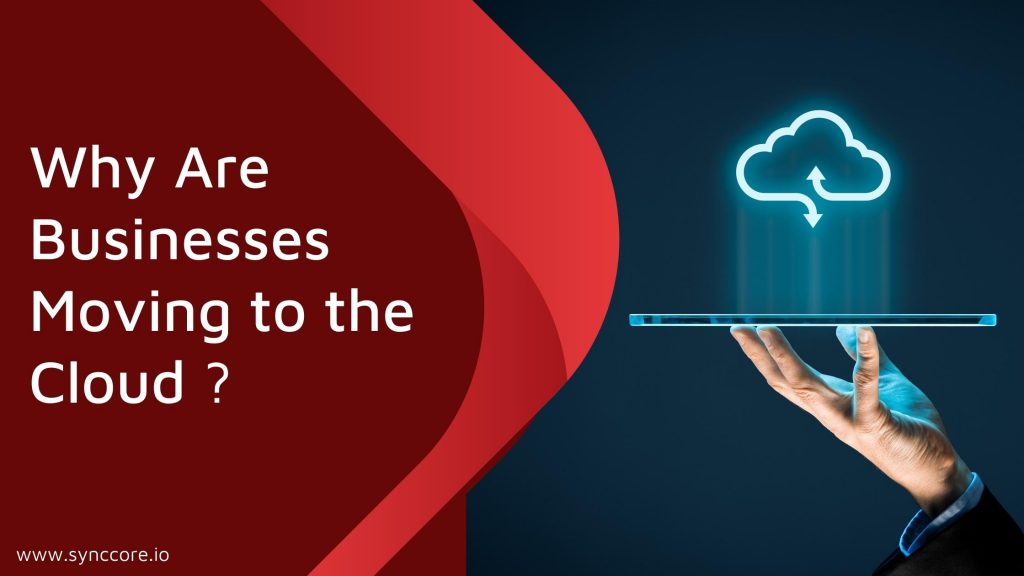Table of Contents
Why Are Businesses Moving to the Cloud?
It’s critical to be competitive and innovative, and cloud technology helps you access files faster, comprehend complex data more readily, and provide enhanced security. As a result, in 2021, more firms will migrate to the cloud. Workers may access workplace systems, platforms, and information from anywhere with cloud technology, providing safe and secure storage. Companies can also reduce their IT expenses by using the cloud.

According to a 2020 Centrify and CensusWide survey, 43% of organizations surveyed had no plans to transition to the cloud by March 2020 fully. However, due to the COVID-19 pandemic, 48 % have streamlined their cloud migration plans, and around 36 % plan to use cloud technology to digitize more of their processes.
What is the cloud?
Software, applications, and other services that run on the internet rather than on a remote server are referred to as cloud computing. Many businesses use cloud technology to supplement or streamline their current operations, data storage, hosting, and app deployment in some way.
In a word, cloud technology enables businesses to re-engineer their back-end architectures (servers, databases, application software, and so on) and deploy them in virtual environments that can be accessed remotely without the need for their own physical server hardware. These computing capabilities are referred to as cloud services (also known as web services). Any employee with an internet connection can also access approved company systems and programmes via the cloud.
What are the top cloud service providers?
For businesses looking for a cloud service provider, there are numerous options. Here are a few of the best service options to think about.
Amazon Web Services: This platform is popular among startups trying to get things up and running in the cloud for a low cost, but it is also powerful enough for huge enterprise operations. Pfizer, General Electric, and Disney are among the firms that employ this cloud service provider, which is regarded as the most comprehensive cloud software to date.
Google Cloud: This well-known PaaS provides cloud computing, storage, big data, and API services, allowing you to create and launch websites and complex applications in the cloud. SQL and NoSQL database services, analytics, and virtual machines are all available and can be mixed and matched to meet your needs. GCP is used by big companies including Target, Home Depot, PayPal, Verizon, Facebook, and Twitch.
Microsoft Azure: It is a PaaS and LaaS cloud provider for enterprises that provides mobile and web app deployment and scaling, database services, virtual machines, mobile back ends, machine learning, and other services. This cloud-based technology could be ideal for businesses looking for cloud access to Microsoft’s well-known suite of products. H&R Block, Bosch, Whole Foods, Xbox, Citrix, KMG Chemicals, and Reuters are among Microsoft Azure’s hundreds of thousands of clients as of 2020.
Alibaba Cloud: Nearly half of China’s websites are powered by this worldwide cloud technology, which is well-known for its security and AI focus. Ford, AirAsia, Schneider Electric, IHG Hotels & Resorts, and Blackboard are among the companies that use this rapidly expanding cloud programme.
SyncCore Cloud: SyncCore Cloud is the first autonomous cloud platform. Synccore is a cloud revolution for SMEs and Enterprise Companies for providing low-priced cloud computing services to help your organization meet its business challenges. Synccore gives you the flexibility and freedom to build, manage and deploy applications on global networks and high-performance technology platforms.
IBM Cloud: IBM Cloud is a reliable cloud technology service that began a little later than its top competitors. It is a top pick among many Fortune 500 firms. Unlike other cloud technologies, IBM has complete control over its implementation, which means it is built by IBM’s own engineers. American Airlines, Bitly, Anthem, ExxonMobil, Honeywell, and Whirlpool are among the company’s top clients.
8 benefits of moving to the cloud for businesses
When firms switch to cloud technology, they can reap a slew of benefits. This change can not only help you save money, but it can also improve the way your employees communicate.

- Cost Savings
Companies had to pay for on-site servers or even off-site data centres before cloud technology. Cloud technology allows your organisation to pay a hosting company rather than hosting the servers in-house, which saves space and money. Switching to the cloud, for example, saves Oracle Cloud customers between 30 & 50 %.
- Improved data security
Data kept in the cloud is encrypted, making it safer than data stored on other types of servers. Furthermore, cloud hosting businesses can keep up with the current cybersecurity concerns because cloud technology is updated frequently and is newer than older data centres, but off-site servers are more vulnerable. Furthermore, cloud hosting companies provide a variety of security options, including firewalls, tokenization, and virtual private networks, so businesses don’t have to focus as much on in-house security (VPNs).
- More transparent data insights and analytics
In seconds, cloud technology can deliver much-needed information and analytics to your fingertips. Not only can you get these insights faster, but it’s also easy to share, collaborate, and evaluate them with all of your employees. Depending on your company’s demands, several cloud solutions also include additional analytics tools and functionality. Descriptive, predictive, prescriptive, and diagnostic analytics are the four main analytics tools.
- Better data recovery
With cloud technology, you won’t have to worry about losing data—even if an emergency occurs, you’ll be able to access your files from anywhere. For improved disaster recovery and company continuity, cloud security provides fail-safes such as keeping your data and platforms on a secondary site in the event of an emergency.
- Ability to scale
Many cloud technology companies offer a pay-as-you-go service model, allowing you to scale up or down as your business grows or changes. This enables you to quickly scale up or down your cloud services as your business model changes.
If you’re a startup, you might not require CRM or data analysis tools right away. Even yet, as your business grows, you may need to expand your cloud technology to include CRM systems and more in-depth analytics.
- Increased collaboration
Cloud technology is arguably best recognised for bringing employees and teams together by allowing users to simultaneously work on documents and spaces while automatically synchronising and saving updates. There’s no need to submit hundreds of different versions of the same document because cloud technology always displays you the most recent version.
- More environmentally friendly
Your organisation can save money on power and have a direct influence on the environment by removing the need for off-site storage or an in-house data centre. Furthermore, because your cloud platform will only supply you with the services you demand, you will only use the power necessary to run your business.
- Increased time savings
Cloud computing saves time in a variety of ways. For starters, implementing cloud technology enables for more rapid training and updates than obsolete software. However, cloud organisations usually provide in-house training as needed, and cloud-based collaborative technologies make communicating and working remotely faster and easier.
Examples of businesses moving to the cloud
Many firms today are unable to function without the use of the cloud. In fact, cloud technology benefits some of the services and platforms you use every day. To learn more, let’s look at a few case examples.
Netflix
Netflix was an early adopter of cloud technology, long before many people even knew what it was. Netflix took its cloud technology to new heights during the pandemic.
Prior to the outbreak, Twitter engineers and developers have produced new features in record time as of March 2020.
National Basketball Association (NBA)
The NBA’s official Twitter account first announced the new analysis technology, which is now being used to provide relevant insights to game broadcasts.
What should your business consider before the move?
There are a number of compelling reasons to use the cloud, whether you go all-in or choose a hybrid approach that splits your server workload between on-premises infrastructure and the cloud. Companies may find a strategic balance between traditional on-site servers and cloud servers, so ask yourself a few questions about your configuration before deciding on the best option.
1. Take a look at your existing back-end infrastructure.
What are your requirements, and what are the requirements of your end-users? What role will cloud diversification play in addressing these issues? Consider your server-side software’s compatibility. While some firms do not migrate all of their server-side architecture to the cloud, ensuring cloud compatibility in the components they remain on-site is beneficial.
2. Decide what should go where.
Plan how you’ll virtualize your back end. Basic server tasks, such as an email server or an app server, can definitely be kept on-site if you’re a small business. Apps that don’t require a lot of data storage might be able to stay local as well. Make a list of your requirements and prioritise them. With a hybrid cloud architecture, you can split the workload and keep little servers on-site to handle smaller workloads, such as file-sharing servers. They can even be set up to sync with cloud storage.
3. What’s your budget?
This will assist you in determining which cloud service is best for you. What’s so fantastic about the cloud? Flexibility. If you start small and discover you need more, you can quickly upgrade subscriptions or purchase additional data—no need to replace hard drives.
4. Who should you hire or have on your team to help?
Do you have a server expert on hand to assist with maintenance or repairs? Cloud servers might be a more seamless integration for IT professionals because they don’t require any hardware, but they are not without their flaws.
5. How scalable does it need to be?
Many firms place a high priority on scalability. How much traffic and data growth you expect for your application or site’s server has a big impact on how you set up your server. Whether you start with a setup that allows you to swap out your old hard drives for new hard drives with more memory or virtualize your setup across multiple smaller servers, you’ll want to be able to expand your server space without having to completely replace it.
6. What type of security environment do you need?
Security is always a worry, so if you have highly sensitive data on your server, you might want to keep it on-site while shifting less sensitive data to the cloud. Alternatively, you can choose for a private cloud/hybrid cloud environment, which allows you to have a more secure environment and gives your IT professionals greater control over what data is stored and shared where.
Conclusion
Cloud adoption is a popular choice among businesses trying to minimise expenses, improve efficiency, and ensure that systems and data are accessible to employees from any location. Cloud technology may help businesses improve their processes, and businesses can gradually migrate from servers to cloud services, scaling up and down as needed.
Cloud technology is unquestionably the way of the future in the workplace, and the benefits it provides will only grow as the technology advances.
Read More:
6 Tips for Choosing the Right Cloud for Your Business in India



